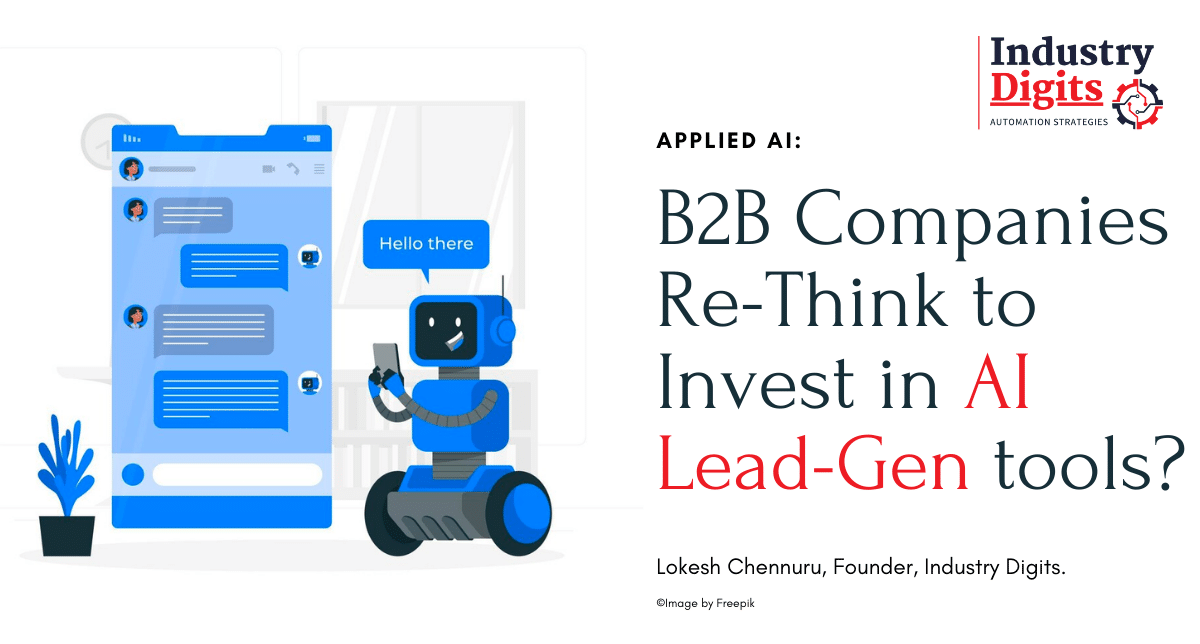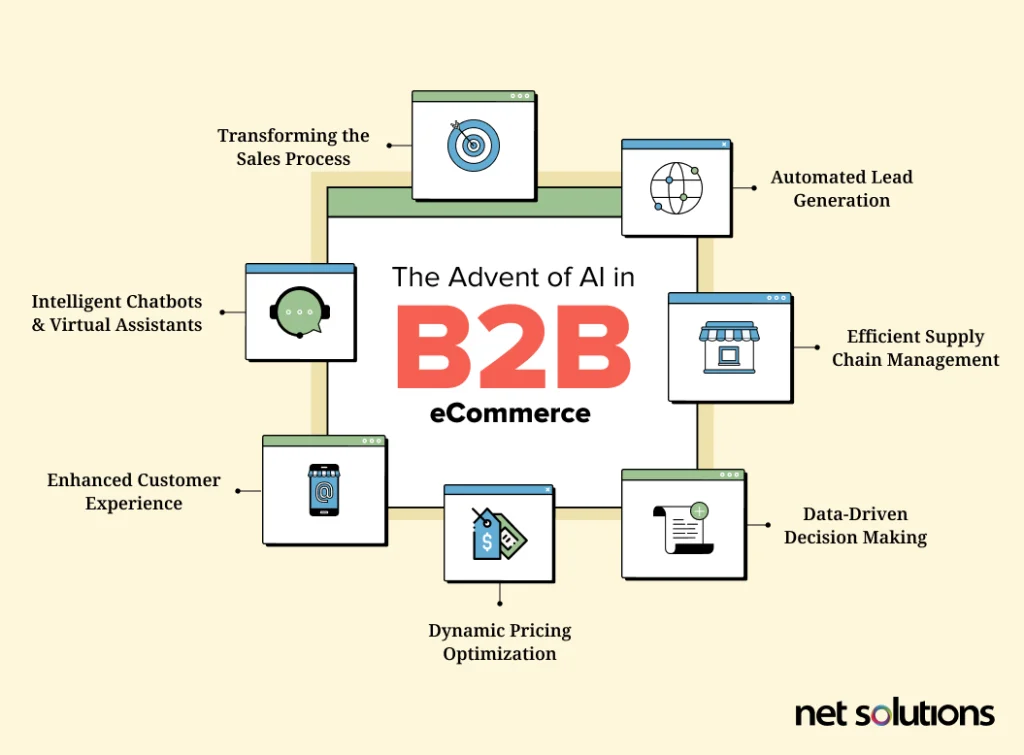How AI Automation For B2B drives digital transformation in B2B companies
Reinvent Your Organization: How AI Automation Is Transforming B2B Workflow
AI automation is reshaping B2B operations in considerable methods. Firms are embracing this technology to streamline workflows and enhance performance. As tasks end up being automated, services can concentrate on critical growth rather than ordinary processes. The implications of these modifications are profound, influencing every little thing from consumer interactions to provide chain monitoring. Comprehending this change is vital, as the future of company depend upon the efficient integration of AI into daily operations. What lies in advance in this evolving landscape?
Comprehending AI Automation in B2B Context
As companies increasingly seek effectiveness, recognizing AI automation within the B2B context becomes important. AI automation refers to the application of artificial knowledge modern technologies to streamline and boost organization processes. In B2B atmospheres, this can manifest in various forms, such as automating data entry, maximizing supply chain logistics, or enhancing supply administration. Organizations leveraging AI automation can lower functional costs, reduce human error, and rise productivity. AI tools can analyze huge amounts of data to give actionable understandings, enabling notified decision-making. The assimilation of AI right into B2B procedures not only transforms traditional workflows but likewise fosters dexterity and scalability, enabling services to adjust to market changes promptly and properly. Welcoming this innovation is necessary for remaining competitive in today's electronic landscape
Enhancing Customer Experience Via AI
Just how can AI change customer interactions in the B2B sector? AI boosts client experience by offering personalized, timely, and effective solution. Online assistants and smart chatbots can handle inquiries 24/7, making sure customers get instant responses. Growth Systems For B2B. Anticipating analytics allow businesses to anticipate customer requirements, tailoring offerings appropriately. AI-driven systems can evaluate client data, permitting targeted advertising methods and improved involvement. Additionally, sentiment evaluation devices examine consumer responses, assisting companies adjust their solutions. By automating regular jobs, AI maximizes personnels to concentrate on high-value interactions, fostering more powerful partnerships. The combination of AI not only enhances communication yet also constructs trust fund and loyalty, eventually elevating the overall customer experience in the competitive B2B landscape

Simplifying Supply Chain Administration With AI
AI plays an essential role in maximizing supply chain administration through predictive analytics and automated inventory control. By leveraging predictive analytics, companies can anticipate demand changes and adjust their procedures as necessary. Automated inventory systems additionally boost performance by making sure supply degrees are preserved, reducing waste and enhancing general performance.
Predictive Analytics Advantages
While numerous services encounter challenges in handling complex supply chains, predictive analytics uses a transformative remedy by leveraging substantial amounts of information to forecast fads and enhance procedures. By analyzing historic information together with real-time inputs, predictive analytics enables companies to determine patterns and anticipate future demands. This insight permits for more enlightened decision-making, improving efficiency and decreasing prices. Furthermore, organizations can proactively address prospective disturbances by predicting supply chain traffic jams and adjusting strategies accordingly. The integration of anticipating analytics not only enhances stock monitoring yet likewise cultivates stronger partnerships with distributors and clients with timely responses to market changes. Ultimately, the fostering of anticipating analytics encourages companies to stay competitive in a progressively dynamic organization environment.
Automated Stock Control
As services significantly count on predictive analytics to maximize supply chain operations, automated inventory control becomes a powerful ally in this effort. By leveraging AI-driven modern technologies, companies can enhance accuracy in supply monitoring, reduce stockouts, and minimize excess supply. Automated systems evaluate real-time data, allowing businesses to predict demand fluctuations and change supply levels accordingly. This not just improves order fulfillment however also improves capital administration by minimizing holding prices. In addition, AI can recognize patterns in purchasing actions, enabling even more informed decision-making relating to supplier connections and procurement techniques. Inevitably, automated stock control not only boosts operational efficiency but also boosts client fulfillment by guaranteeing product schedule, strengthening its duty as an essential element in modern supply chain administration.
Data-Driven Choice Making Powered by AI
In today's affordable landscape, companies significantly rely upon data-driven decision-making to boost operational effectiveness and tactical preparation. Expert system plays a pivotal duty in this change by assessing large quantities of data promptly and precisely. AI formulas recognize patterns, fads, and anomalies that human experts might ignore, enabling organizations to make educated choices based upon real-time insights. This capacity allows firms to predict market changes, maximize resource allowance, and customize their offerings to client demands. In addition, AI-driven analytics promote danger assessment and monitoring, ensuring that companies can browse uncertainties properly. By leveraging these sophisticated devices, businesses not only boost their decision-making processes yet likewise acquire an affordable advantage in their corresponding markets, fostering growth and advancement.
Automating Repeated Jobs to Boost Productivity

Integrating AI With Existing Organization Processes
When incorporating AI here with existing business processes, lots of companies encounter obstacles. These challenges often come from an absence of understanding concerning exactly how AI can enhance existing operations. Effective integration needs an extensive analysis of existing operations to recognize areas where AI can add value. Organizations should also guarantee that their teams are outfitted with the needed abilities to utilize AI devices properly. Additionally, smooth assimilation depends upon the compatibility of AI innovations with tradition systems. Firms typically discover it helpful to embrace a phased method, piloting AI applications in particular departments prior to a more comprehensive rollout. This technique enables adjustments based on first comments, ensuring smoother changes and optimizing the prospective benefits of AI automation in boosting efficiency and performance.
Future Fads in AI Automation for B2B Business
As B2B firms look to the future, boosted information analytics is readied to play an essential duty in driving decision-making processes. Intelligent process automation will likewise become a key pattern, enhancing and simplifying operations efficiency. These improvements promise to reshape exactly how businesses operate, inevitably causing more active and responsive companies.
Boosted Information Analytics
While organizations progressively depend on data-driven choices, the duty of AI in boosting data analytics is becoming more necessary in B2B procedures. AI innovations assist in the collection and evaluation of huge datasets, enabling business to uncover important understandings that drive tactical preparation. Anticipating analytics powered by AI permits companies to anticipate market patterns and consumer actions with greater precision. In addition, artificial intelligence formulas improve data interpretation, recognizing patterns that human experts might overlook. This results in even more informed decision-making and optimized resource allotment - Growth Systems For B2B. As B2B firms remain to accept AI-driven analytics, they can anticipate improved operational efficiency, boosted client experiences, and an one-upmanship in the market. The future of information analytics in B2B rests on integrating innovative AI capacities
Smart Refine Automation
Smart Refine Automation (IPA) is positioned to revolutionize B2B procedures by perfectly incorporating AI modern technologies with standard organization procedures. This innovative strategy combines robotic process automation (RPA) with innovative AI abilities, making it possible for companies to enhance performance and accuracy. Business can automate repeated jobs, such as data entrance and invoice handling, allowing staff members to concentrate on calculated efforts. IPA also leverages artificial intelligence and natural language handling, improving decision-making via real-time data evaluation. As businesses significantly take on IPA, they can expect considerable cost decreases and boosted consumer experiences. Future trends show an expanding reliance on IPA for scalability and adaptability, placing companies to prosper in an ever-evolving industry. Welcoming IPA will certainly be necessary for preserving competition in the digital age.
Regularly Asked Questions
What Industries Benefit Most From AI Automation in B2B Operations?
Production, logistics, money, and medical care sectors benefit most from AI automation in B2B procedures. These industries leverage automation to enhance performance, minimize expenses, simplify processes, and boost decision-making with data-driven understandings and anticipating analytics.
Just How Can Small Services Implement AI Automation Properly?
Little organizations can carry out AI automation efficiently by recognizing recurring jobs, selecting appropriate tools, integrating options gradually, educating personnel, and continuously assessing performance to optimize procedures, maximizing and ensuring a smooth transition effectiveness. AI Automation For B2B.
What Are the Expenses Connected With AI Automation Implementation?
The costs connected with AI automation execution commonly include software program purchase, infrastructure upgrades, training team, recurring upkeep, and prospective assessment charges. These costs can vary considerably based on the range and intricacy of the automation solutions chosen.
How Do I Gauge ROI From AI Automation Initiatives?
To determine ROI from AI automation efforts, one need to examine price financial savings, efficiency enhancements, and earnings growth versus implementation prices. Tracking vital performance indications in time provides useful insights into performance and general return on financial investment.
What Skills Are Required to Take Care Of AI Automation Projects?
Effective monitoring of AI automation tasks needs abilities in job administration, information analysis, programs, and recognizing AI technologies. In addition, solid interaction, problem-solving abilities, and versatility are vital for steering the intricacies of such efforts.
As businesses progressively seek performance, recognizing AI automation within the B2B context becomes important. The combination of AI right into B2B procedures not only transforms conventional operations however additionally promotes dexterity and scalability, allowing companies to adjust to market adjustments swiftly and successfully. While companies significantly count on data-driven decisions, the function of AI in enhancing data analytics is ending up being extra crucial in B2B operations. Intelligent Refine Automation (IPA) is poised to transform B2B procedures by effortlessly incorporating AI modern technologies with traditional service procedures. Effective monitoring of AI automation tasks requires abilities in task management, data analysis, shows, and comprehending AI technologies.